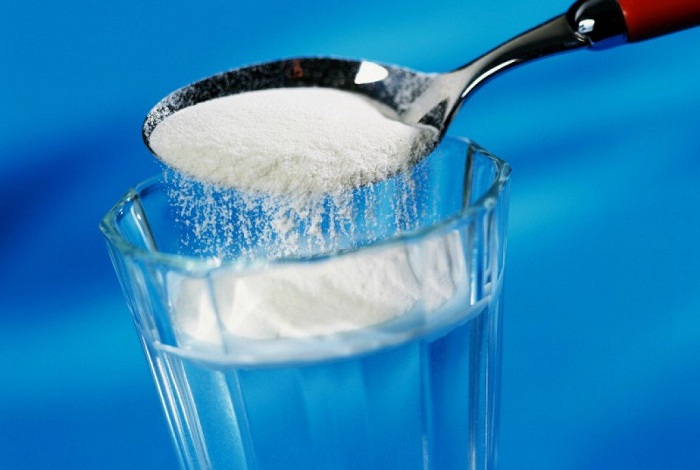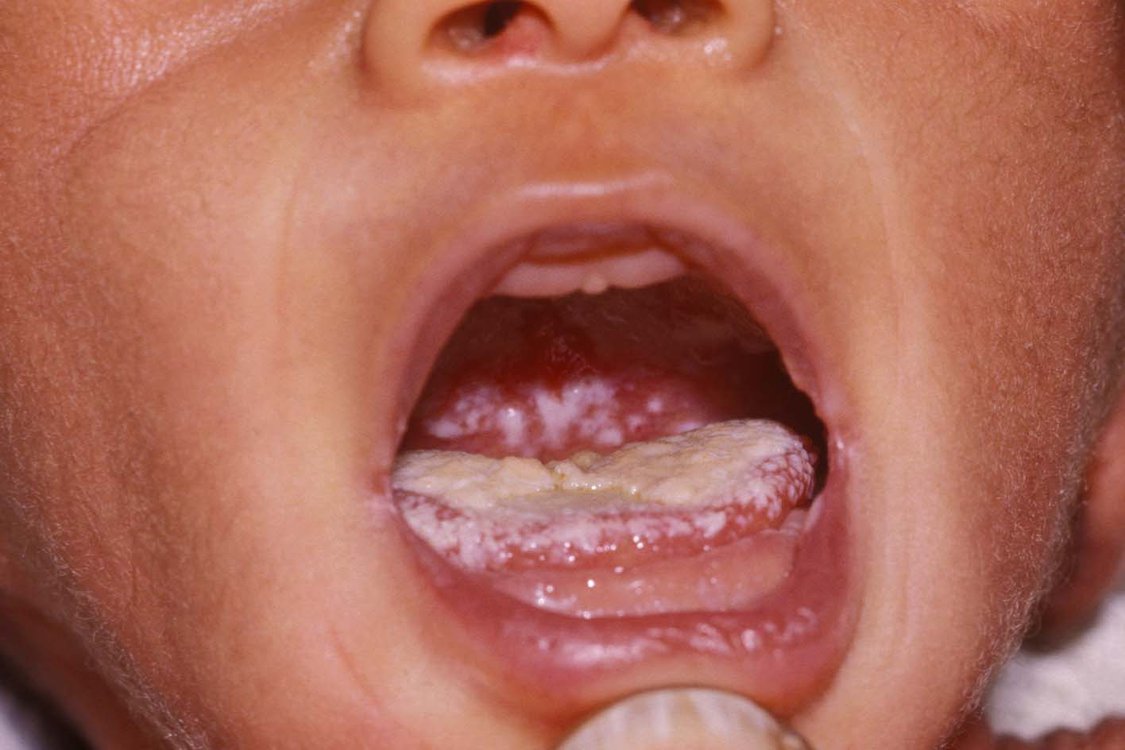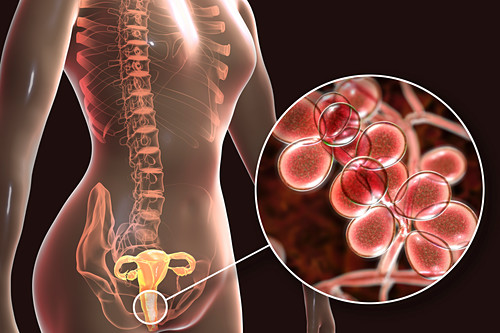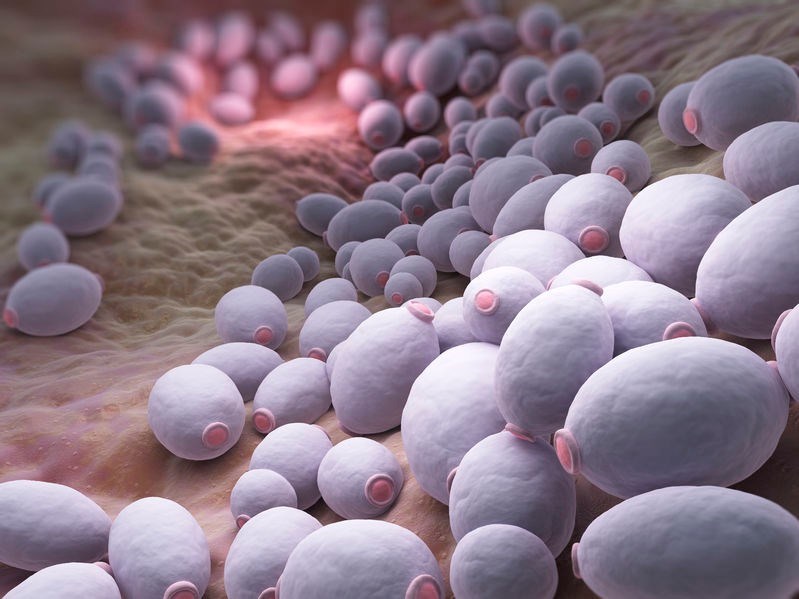Oral candidiasis, Hairy leukoplakia.
Root Cause of Disease
- Taking a course of antibiotics, particularly over a long period or at a high dose.
- Taking inhaled corticosteroid medication for asthma.
- Wearing dentures (false teeth), particularly if they don’t fit properly.
- Poor oral hygiene.
Symptoms
Thrush isn’t a slow-and-steady type of infection. Instead, it develops quickly. Here are common symptoms:
- Cottage-cheese-like lesions Creamy white, slightly raised sores often appear on the tongue or inner cheeks, but they can also develop on the roof of the mouth, gums, tonsils, or the back of the throat.
- Sore mouth
- Loss of taste
- Cottony feeling in the mouth
- Painful swallowing
- Cracked and red corners of the mouth
- Bleeding lesions This can occur when the sores are scraped during toothbrushing.
- Fussiness and irritability These are symptoms associated with infants with thrush.
Causes
Normally, your immune system works to repel harmful invading organisms, such as viruses, bacteria and fungi, while maintaining a balance between “good” and “bad” microbes that normally inhabit your body. But sometimes these protective mechanisms fail, increasing the number of candida fungus and allowing an oral thrush infection to take hold. Stress can cause it.
So can a number of medical conditions, like:
If you smoke or wear dentures that don’t fit right might, you’re also more likely to get thrush. And babies can pass the infection to their mothers while breastfeeding
Home Remedies to treat Oral Thrush
Remedy – 1: Salt Water
Materials: Salt, Hot water

Salt has antiseptic, cleansing, and soothing properties. This makes it a common home remedy for many oral problems.
Rinsing your mouth with salt water could help relieve symptoms of oral thrush.
Procedure:
- Dissolve 1/2 teaspoon salt in 1 cup warm water.
- Swish the solution throughout your mouth.
- Spit out the salt solution.
Remedy – 2: Yogurt
Materials: Yogurt

Probiotic yogurt contains live, “good” bacteria cultures that may help treat oral thrush.
The cultures don’t kill Candida. Instead, they stop its growth. They may also help restore the proper balance of good to bad bacteria in the mouth.
Since its soft, yogurt is also a great food to eat if you’re having trouble swallowing due to painful mouth and throat lesions.
Procedure:
- Eat yogurt a couple times daily at the first sign of oral thrush.
- Choose unsweetened varieties of yogurt since Candida thrives on sugar.
- If you don’t like yogurt, you can get the same benefits by taking a daily Probiotic supplement.
Product link: Yogurt
Remedy – 3: Lemon juice
Materials: Lemon, Water

Lemon juice is thought to have antiseptic and antifungal abilities that help it fight against the fungus that causes thrush.
According to a small 2009 study, lemon juice was found to be a more effective treatment for oral thrush than gentian violet among people with HIV. (Gentian violet is another home remedy for oral thrush, but recent evidence shows it may cause cancer.) Since the study was small, more research is needed.
Procedure:
- Add the juice of half a lemon to 1 cup warm or cool water.
- Drink the mixture, or use as a mouth rinse.
Some people apply lemon juice directly to thrush lesions, but the lemon’s acidity may cause burning and irritation.
Other Remedies
Turmeric
Turmeric gets its vibrant yellow color from curcumin. Curcumin is a powerful compound thought to have anti-inflammatory abilities.
According to a 2010 study on mice, curcumin may treat oral thrush. The study found curcumin to be an antifungal against both albicans and non-albicans species of Candida, especially when combined with piperine.
Piperine is a compound found in black pepper that helps the body absorb turmeric. Further research is needed on humans.
Procedure:
- Make “golden milk” by combining 1/4 to 1/2 teaspoon turmeric paste (store-bought or homemade) with a dash of black pepper and 1 cup filtered water or milk of your choice.
- Heat in a saucepan until warm.
- Swish the mixture throughout your mouth as you drink it.
Oregano oil
Oregano oil is used to flavor foods, but it also has antimicrobial and antifungal abilities.
According to older research from 2001 conducted on mice and in vitro, oregano oil was effective against Candida albicans. Further research is needed.
Procedure:
- Combine 2 drops oregano oil with 1 cup water.
- Swish the mixture throughout your mouth.
- Spit out the solution.
Never use undiluted oregano oil orally or topically.
Product link: Oregano Oil
Apple cider vinegar
People with dentures have a higher risk of oral thrush. Dentures that don’t fit properly or that aren’t cleaned well provide the ideal environment for Candida to thrive. This may cause a condition similar to thrush called denture stomatitis.
According to a 2015 in vitro study, Apple cider vinegar has antifungal properties against Candida and may be a good alternative treatment option for people with denture stomatitis.
Procedure:
- Add 1 teaspoon raw, unfiltered apple cider vinegar to 1 cup water.
- Swish the rinse throughout your mouth for at least 15 seconds.
- Spit out the mixture.
Some natural health professionals recommend rinsing with undiluted apple cider vinegar, but this may cause a painful burning sensation in your mouth.
Product link: Apple cider Vinegar
Tea tree oil
Dilute a few drops of tea tree oil in a carrier oil, such as coconut oil or olive oil, and apply it directly to the affected area. Tea tree oil has antifungal and antibacterial properties that can help to kill off the Candida fungus and prevent further infection.
Garlic
Eating raw garlic or taking garlic supplements may help to boost the immune system and fight off the fungal infection. Garlic has antifungal and antibacterial properties that can help to kill off the Candida fungus.
Oil pulling
Swish a tablespoon of coconut or sesame oil in your mouth for 15-20 minutes, then spit it out. Oil pulling can help to remove harmful bacteria and fungi from the mouth and prevent further infection.
Preventions
These measures may help reduce your risk of developing candida infections:
- Rinse your mouth: If you need to use a corticosteroid inhaler, be sure to rinse your mouth with water or brush your teeth after taking your medication.
- Brush your teeth at least twice a day and floss daily or as often as your dentist recommends.
- Check your dentures: Remove your dentures at night. Make sure dentures fit properly and don’t cause irritation. Clean your dentures daily. Ask your dentist for the best way to clean your type of denture.
- See your dentist regularly, especially if you have diabetes or wear dentures. Ask your dentist how often you need to be seen.
- Watch what you eat: Try limiting the number of sugar-containing foods you eat. These may encourage the growth of candida.
- Maintain good blood sugar control if you have diabetes: Well-controlled blood sugar can reduce the amount of sugar in your saliva, discouraging the growth of candida.
- Treat a vaginal yeast infection as soon as possible.
- Treat dry mouth: Ask your doctor about ways to avoid or treat your dry mouth.




